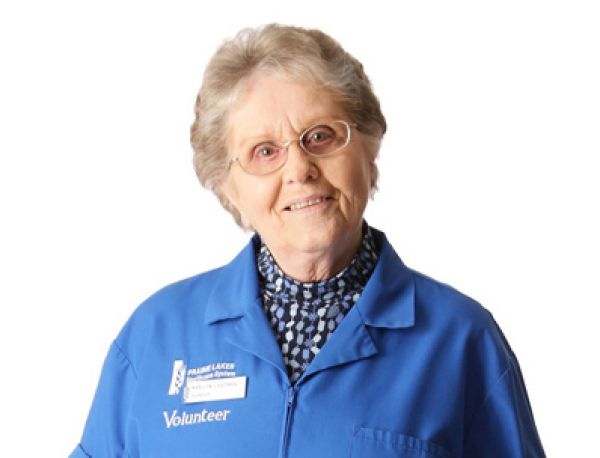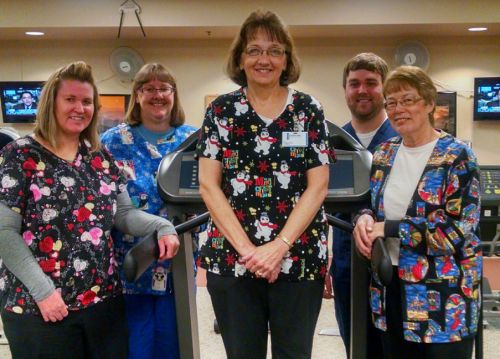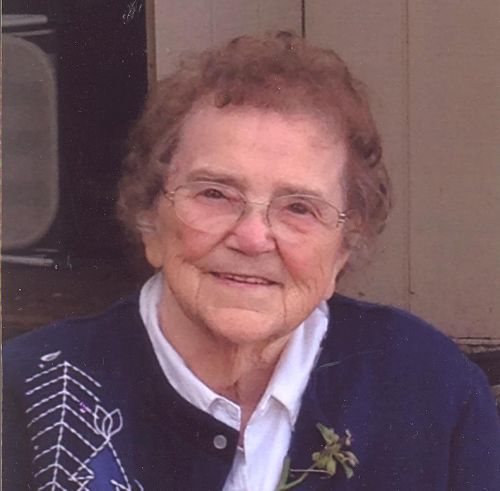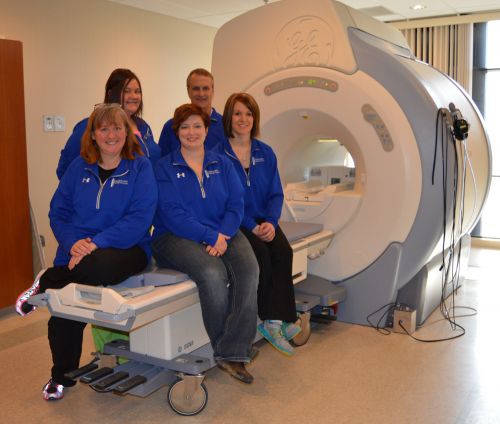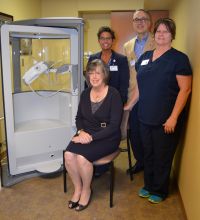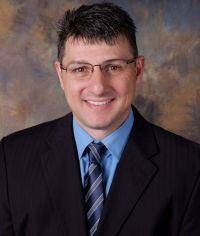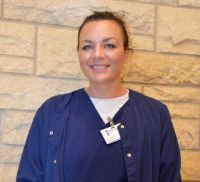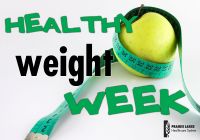Monday, April 13, 2015
The Dynamic Duo
Did you know that in the year 2014, Prairie Lakes volunteers generously donated 8,167 hours of their own time and energy? Our gracious volunteers donate time at the Information Desk, Gift Shop, clinics, laundry, hospice and so much more. The warm sincerity from volunteers cannot be replicated by anything else, as they are here for the community; they donate their time for you.
Stroll by the PLHS Volunteer Information Desk at the hospital main entrance and you feel a new surge of power emanating from the duo behind the desk. That energy you feel is a new duo volunteer system. As PLHS continues to offer expanded services to our communities, we see an increase in the number of patients and visitors that pass through our doors. This duo volunteer system will allow a volunteer to be present at the Information Desk to assist patients and families as the secondary volunteer provides patient transport, delivers paperwork, newspapers and flowers. The duo system is here to better serve you!
Interested in volunteering? Click here.
Published in
News and Announcements
Tuesday, March 24, 2015
Diabetes Alert Day 2015
Over 32 million people have diabetes. More than a quarter of people with diabetes.. don’t know they have it.
American Diabetes Association Alert Day® is a "wake-up call" asking the American public to take the Diabetes Risk Test to find out if they are at risk for developing type 2 diabetes, the most common type. It's time to learn your risk for type 2 diabetes. Take the Diabetes Risk Test now at http://diabetes.org/takethetest.
A healthy life style can help prevent diabetes. The US Department of Health and Human Services recommends 2.5 hours of physical activity for adults each week and 1 hour of physical activity for children each day. Nutrition is important as well. A healthy diet contributes to a healthy body inside and out. To learn about food choices that help prevent or manage diabetes, click here.
If you or someone you know was just diagnosed or needs support in managing their diabetes, Prairie Lakes offers a free Diabetes Support Group. All are welcome, but issues addressed are more targeted for people with type 1 diabetes. The next session at Prairie Lakes is April 9th at 6 p.m.; it will cover cardiac and pulmonary health. Children, families, and adults are welcome to attend. Pre-register here.
What do the different types of diabetes mean?
Type 1 diabetes is usually diagnosed in children and young adults, and was previously known as juvenile diabetes. Only 5% of people with diabetes have this form of the disease. In type 1 diabetes, the body does not produce insulin. Insulin is a hormone that is needed to convert sugar, starches and other food into energy needed for daily life. With the help of insulin therapy and other treatments, even young children can learn to manage their condition and live long, healthy lives.
Type 2 diabetes is the most common form of diabetes. If you have type 2 diabetes your body does not use insulin properly. This is called insulin resistance. At first, your pancreas makes extra insulin to make up for it. But, over time it isn't able to keep up and can't make enough insulin to keep your blood glucose at normal levels.
Published in
News and Announcements
Friday, March 13, 2015
What is Pulmonary Rehab?
We celebrate Pulmonary Rehab week March 8 – 14, 2015 by honoring both the patients who participate in our program and the healthcare professionals who support, educate, and guide them every day. Do you or someone you know have a chronic lung disease? Learn about Pulmonary Rehab and if it's right fit with this Q& A with Bobbie Bach.
Q: What is pulmonary rehabilitation?
A: Pulmonary rehabilitation is a program designed for people who have chronic lung disease. Its primary goal is to enable people to achieve and maintain their maximum level of independence and functioning. Although most pulmonary rehabilitation programs focus on people who have chronic obstructive pulmonary disease (COPD), people with other types of lung disease may benefit as well. People in all age groups can benefit, including those older than 70.
Q: When did PLHS introduce the program?
A: Prairie Lakes Healthcare Systems was able to re-introduce the Pulmonary Rehabilitation program in the fall of 2013 after the Pulmonology Clinic opened with Dr. Kowitz. Since then we have had over 50 patients go through the program, which consists of them meeting twice a week for six weeks at time.
Q: How can pulmonary rehabilitation improve life’s daily functions?
A: Pulmonary rehabilitation can’t cure chronic lung disease, but it’s programs may improve quality of life by reducing shortness of breath, increasing exercise tolerance, promoting a sense of well-being, and, to a lesser extent, decreasing the number of hospitalizations.
Q: What does pulmonary rehabilitation consist of?
A: The team will create a plan specific for each individual's case. It is important to understand that there is much more to lung health than focusing on the lungs themselves. Patients must also incorporate the healthy lifestyles learned in class for the best results. Pulmonary rehabilitation can consist of:
- Breathing strategies
- Exercise
- Nutritional education
- Psychological counseling and support for dealing with chronic disease issues and stress
- Education on their disease
- Meeting with a pharmacist for medication compliance
- Meeting with Occupational Therapy for energy conservation tips
- Meeting with Physical Therapy for good body mechanics review
To learn more about pulmonary rehab click here.
Published in
News and Announcements
Tuesday, March 10, 2015
A Special Lady & Her Legacy
Surrounded by her family, Zelta Jean Wall was almost 93 years old when she passed away in November, 2014 in her home near Strandburg. Throughout her life, Zelta Jean was involved in numerous clubs and activities. One such activity was raising money for the Suzanne Jacobson Memorial Fund (SJMF) through her volunteer work during Yellow Rose Week. She did so to help others and to continue the legacy of her healthcare provider, neighbor and dear friend, Suzanne Jacobson.
Zelta Jean was the first volunteer to assist with Yellow Rose Week. She was energetic, enthusiastic and passionate about raising funds for the SJMF. Perhaps Zelta Jean’s most coveted sales tactic was her genuine flair of humor. Prior to her passing, Zelta Jean informed her family she wished for all memorials in her honor to go to the SJMF. The SJMF received over $4,000 from the family and other donors due to this request. What a wonderful gift to SJMF grant recipients!
In honor of her generosity and dedication to the SJMF campaign, Yellow Rose Week 2015 will be held in honor of Zelta Jean Wall. Her legacy and commitment to the SJMF will forever be appreciated and remembered.
The SJMF is a service of the Prairie Lakes Healthcare Foundation, which provides $500 grants annually to people with a life threatening illness who reach financial hardship. Since its inception in 1999, the SJMF has provided $265,000 in grants. If you wish to know more about the SJMF, to volunteer during Yellow Rose Week, to receive a SJMF application, or to make a donation call the Prairie Lakes Healthcare Foundation at 605-882-7631.
Published in
News and Announcements
Wednesday, February 25, 2015
New MRI Technology Now Available
Prairie Lakes Healthcare System is proud to announce an upgrade to the MRI machine in radiology. The upgrade brings state of the art technology to the Watertown area, without having to replace the MRI’s magnet.
The upgrade to a Signa HDxt 1.5T from GE Healthcare makes the MRI machine engineered for enhanced image contrast, reduced blurring, and reduced artifacts so your doctor can see more. This system also incorporates motion correction to help reduce the need for rescans. The update allows the exam to be much more patient friendly, for the patient who might be prone to claustrophobia, they spend significantly less time in the scanner. Prairie Lakes’ radiology staff now can scan rapid high resolution imagining acquiring crisp 3D gradient images, even while the patient breathes.
Beyond crisper images, the upgrade has made available new scans for urology, nephrology, and orthopedic patients in Watertown. For example color coded CartiGrams are offered to detect osteoarthritis (a common joint disorder due to wear and tear on a joint) early and can be used to determine the best course of treatment.
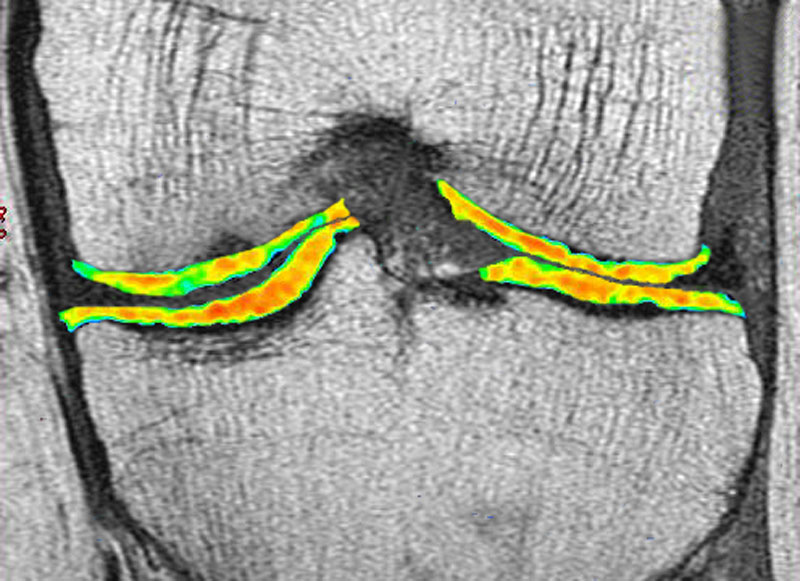 CartiGram of a knee
CartiGram of a knee
Published in
News and Announcements
Monday, February 23, 2015
American Heart Month
Take care of your heart and your heart will take care of you. Extensive clinical and statistical studies have identified several factors that increase the risk of coronary heart disease or heart attack.
Major risks that you can modify include smoking, high cholesterol, blood pressure, physical inactivity, obesity, and diabetes. Keeping active, eating healthy, and not smoking are good habits that will lessen your chance of many health conditions and diseases. Prairie Lakes' patient Shera had been smoking for 45 years when she had a heart attack last year. Now she has a story to tell. Shera's testimonial will be played at Ladies Night Out February 27th.
It's hard to tell what's happening to you in the moment. Most heart attacks start slowly, with mild pain or discomfort. It is important to know the signs. The American Heart Association recommends watching these symptoms as a sign of a heart attack:
- Chest discomfort. Most heart attacks involve discomfort in the center of the chest that lasts more than a few minutes, or that goes away and comes back. It can feel like uncomfortable pressure, squeezing, fullness or pain.
- Discomfort in other areas of the upper body. Symptoms can include pain or discomfort in one or both arms, the back, neck, jaw or stomach.
- Shortness of breath with or without chest discomfort.
- Other signs may include breaking out in a cold sweat, nausea or lightheadedness.
If you think you or someone you love maybe at risk for a heart attack or heart disease, Prairie Lakes offers Target Heart Screenings for only $45. Consider Target Heart if you have any of the following risk factors: Family history of heart disease | High cholesterol | History of smoking | High blood pressure | High stress levels | Sedentary lifestyle | Diabetes | Overweight | Postmenopausal female
Published in
News and Announcements
Thursday, February 05, 2015
BASH 2014 Dollars Put To Good Use
The Prairie Lakes Healthcare Foundation provided a check for $43,000 to Prairie Lakes Healthcare System to purchase new pulmonary function testing (PFT) equipment. This type of testing has increased 86% since pulmonologist Dr. Jeffrey Kowitz joined PLHS in August 2013. The new equipment is called a body plethysmography unit. It is essentially a large box the patient sits in during a series of breathing exercises to allow for measurement of the overall condition of the lungs, including effort extended for inhaling and exhaling air, lung capacity, oxygen saturation, and other indicators specific to the health of the lungs.
The money for this project was raised during BASH (Building A Superior Hospital) 2014, an annual gala event hosted by the Prairie Lakes Healthcare Foundation. BASH 2015: A Sense-ational Celebration will be held on Saturday, May 9, 2015. Proceeds for this event will be directed towards the enhancement of Ear, Nose and Throat and Facial Plastic Surgical services. Tickets will be on sale soon!
The mission of the Prairie Lakes Healthcare Foundation is: Healthcare is a vital component of a community’s quality of life. Prairie Lakes Healthcare Foundation exists to raise funds with which to support and advance the health services available to the Watertown area through Prairie Lakes Healthcare System. Thank you to our donors for supporting this mission and strengthening healthcare in our region.
*Photo: New PFT equipment. Seated is Jill Fuller, President/ CEO of Prairie Lakes Healthcare System; standing from left to right: Alison Gilbertson, Executive Director of Prairie Lakes Healthcare Foundation, Dr. Jeffery Kowitz, Pulmonologist and Deb Pederson, Director of Respiratory Therapy.
Published in
News and Announcements
Thursday, January 29, 2015
Welcome Grant Tillett, Chief Information Officer
Welcome Chief Information Officer Grant Tillett to the Prairie Lakes administrative staff. As Chief Information Officer, Tillett will provide executive leadership for strategic IT projects.
For the past two years Tillett worked at TruBridge, a subsidiary to CPSI, that’s in the business to consult and manage IT services for rural and community health providers. Prior to TruBridge Tillett worked at Prairie Lakes for nine years in the IT department.
“I am thankful for the opportunity to return to Watertown and join the executive team at Prairie Lakes Healthcare System,” said Tillett. “In addition, I am looking forward to working on the strategic projects at Prairie Lakes and continuing to improve the utilization of the electronic health record.”
Published in
News and Announcements
Monday, January 26, 2015
Prairie Lakes Welcomes Wound Ostomy Continence Nurse
Welcome Jackie Mack, Wound Ostomy Continence Nurse, to Prairie Lakes growing wound care department.
Wound ostomy continence nurses provide acute and rehabilitative needs for people with selected disorders of the gastrointestinal, genitourinary and/or integumentary system; and provide direct care to people with abdominal stomas, wounds, fistulas, drains, pressure ulcers, and/or continence disorders.
"I am very much looking forward to growing the wound care department," said Jackie Mack. "Wound care is such an integral part of healthcare, especially with the increasing population of patients with diabetes and complicated medical histories, and I look forward to serving this area."
Published in
News and Announcements
Sunday, January 18, 2015
Healthy Weight Week
We celebrate healthy lifestyles that last a lifetime. This week try these exercise tips and whip up this healthy, easy mediterranean turkey wrap recipe to live actively, eat well, and feel good.
Mediterranean Turkey Wrap, recommended by Prairie Lakes/Sodexo Dieticians
Prep Time: 15 minutes. Seving size: 1 wrap. 280 calories, 28 g carbs, 36 g protein
Ingredients: 8 tablespoons hummus | 4 whole-wheat wraps, heated | 12 ounces no-salt added, deli-style turkey | ½ large cucumber, peeled and diced (about 1 cup) | 2 roma tomatoes, diced (about 1 cup) | ¼ cup reduced-fat, crumbled feta cheese | 4 green olives, diced
Instructions: Spread 2 tablespoons hummus on wrap. Top with 3 ounces turkey, ¼ cup cucumber, ¼ cup tomatoes, 1 tablespoon feta cheese and 1 diced olive. Fold wrap to close. Repeat procedure for remaining 3 wraps.
The Perfect Squat, by Prairie Lakes Rehab Team
Wide stance targets hamstrings & gluts. Narrow stance targets quads
- Hinge at your hips like sitting in a chair
- Knees behind toes
- Weight on your heels
- Back straight; Abs tight; Chest up
- Alignment of hip, knee & big toe
- Don’t let knees cave inward

The Perfect Lunge, by Prairie Lakes Rehab Team
- Step forward to 90 degrees at the hip & knee
- Front knee should not extend past the toes
- Back knee should not touch the ground
- Alignment of hip, knee & big toe
- Don’t let the front knee cave inward
- Keep your hips level
- Abs, gluts and quads tight
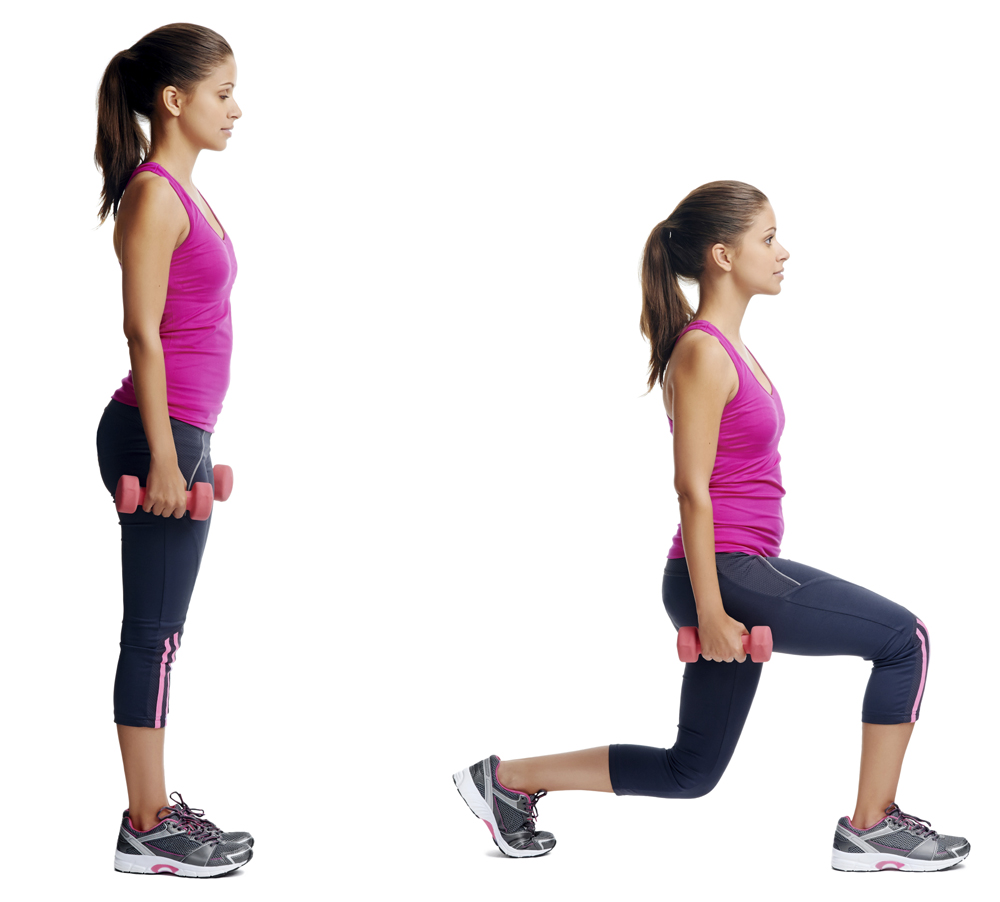
Published in
News and Announcements
More...
Thursday, January 08, 2015
Black Widow Academy Provides Donations to the Caring Club House
Members of the Black Widow Academy (BWA) donated a variety of items to the Prairie Lakes Caring Club House. BWA is a strength and conditioning program for all fitness levels aimed at improving muscular strength, cardio-respiratory endurance and flexibility. BWA is located at 1744 7th Avenue, SW in Watertown, SD. Pictured are participants of a class, including owner, cross-fit trainer and life coach, Marciea Allen (bottom right), as well as Alison Gilbertson, Executive Director of the Prairie Lakes Healthcare Foundation and Linda Page, Caretaker of the Caring Club House.
The Prairie Lakes Caring Club House was created to help meet the hospitality needs of out-of-town patients receiving services through Prairie Lakes, their families and caregivers. Funded and furnished completely through community support and donations, the Caring Club House is a not-for-profit, community based project of the Prairie Lakes Healthcare Foundation.
Published in
News and Announcements
Sunday, January 04, 2015
Welcome the 1st Baby of 2015
Greg Benson and Jennifer Whisman welcomed their new child Marley-Ann Rose at 8:34 p.m. January 2nd, weighing 6 lbs 10 oz and measuring 18 ¾ inches in length. Marley-Ann is the first baby to be born at Prairie Lakes Healthcare System in Watertown in 2015. Her parents, brothers Johnathan, Devlin, and Jacob, and grandparents, Alvin and Julie Whisman of Watertown and Jimmy and Janie Benson of Watertown, are excited to welcome Marley-Ann into their family.
Published in
News and Announcements
Wednesday, December 31, 2014
National Medical Resources Provides Donation to Prairie Lakes Healthcare Foundation
Darin Musser, SD Accounts Manager of National Medical Resources (NMR) presented a $2,000 check to Alison Gilbertson, Executive Director of the Prairie Lakes Healthcare Foundation. NMR is a leading locum tenens physician and nurse practitioner staffing company based in Bismarck, North Dakota. It provides services to hospitals and facilities in the state of North Dakota and the upper Midwest. NMR strives to give back to the communities it provides services to, be that by participating in local events, giving to area foundations or volunteering their time.
The Prairie Lakes Healthcare Foundation is very thankful for NMR’s donation to our “Give Tomorrows” fund (general fund). The Foundation exists to raise funds with which to support and advance health care services through Prairie Lakes Healthcare System. For questions about how you can make a donation, please contact the Foundation office at 882-7631 or by This email address is being protected from spambots. You need JavaScript enabled to view it..
Published in
News and Announcements
Monday, December 29, 2014
Home Health is Moving
Prairie Lakes Home Health Office will move from their current location on Highway 212 to Prairie Lakes’ hospital campus this week. Home Care, Home Connections and Hospice services will now be based out of the hospital.
Please note Home Health's phone, fax, and mailing address will remain the same.
New physical address:
401 9th Avenue NW
Watertown, SD 57201
We look forward to working with you from our new location at the hospital that better serves our staff. For further information regarding our move or services, please contact our office at 605-882-7745 or click here.
Published in
News and Announcements
We can help you find a doctor. Call 605-882-7000 or search online.
